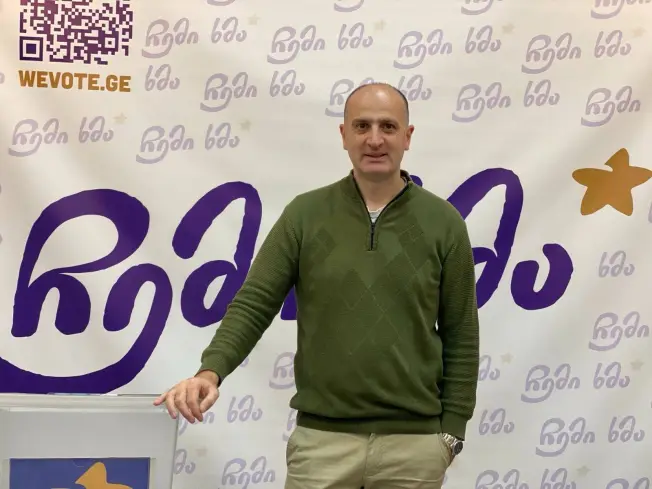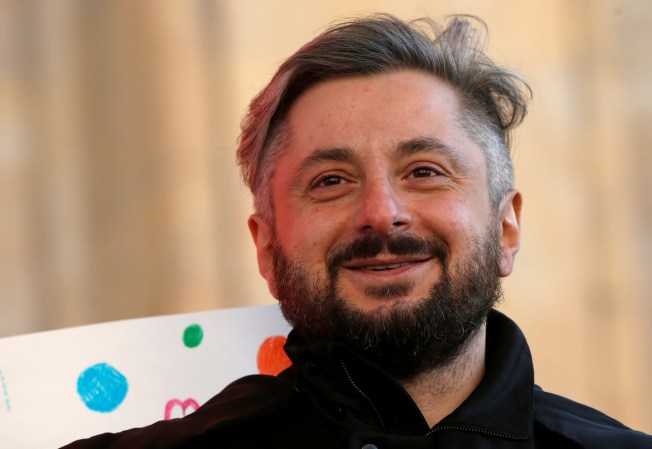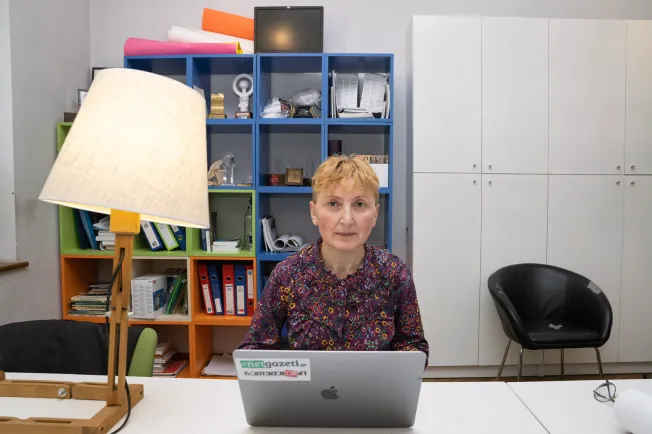On October 26, Georgia heads into what is widely viewed as its most critical election since independence from the Soviet Union in 1991. The incumbent party Georgian Dream is pitted against a loose coalition of pro-Western parties united under the Georgian Charter, a roadmap for Georgian integration into the European Union.
Georgia’s relation to the EU is a central issue of the vote. While the population is overwhelmingly in favor of joining the union — the country was granted EU candidate status last year — Georgian Dream has taken a sharply anti-Western turn, sparking fears it is steering the country into neighboring Russia’s embrace. In May, parliament overrode a presidential veto to pass a Russian-style “foreign agents” law, directly targeting the heavily donor-reliant independent press. If Georgian Dream wins the parliamentary election, it has vowed to crack down on what it calls the “collective” opposition, a threat many fear extends to the pro-opposition press.
On a fact-finding mission to Georgia this month with several partner groups, CPJ asked local journalists, advocates, and a journalist turned opposition politician what they feel is at stake in the upcoming vote. Their answers have been edited for length and clarity.
CPJ emailed the Georgian Dream party for comment on the concerns raised by interviewees, but did not receive a reply.

Mamuka Andguladze, chair of Media Advocacy Coalition, which promotes media rights
How important are this month’s elections for press freedom in Georgia?
The upcoming elections represent a critical juncture for press freedom in Georgia. At stake is not only the integrity of our democratic processes but also the very foundation of independent Georgian journalism. In what is already a very challenging landscape, the adoption of the “Russian law” [the “foreign agents” law] poses a severe threat to independent media’s survival. The law stigmatizes media outlets as “organizations pursuing the interests of a foreign power” essentially as “foreign agents.” It subjects them to invasive monitoring and an obligation to provide authorities with any information they demand, which could threaten outlets’ sources and contacts, making it impossible for them to operate. This is not to mention heavy fines for alleged violations.
Georgian journalists are frequently the target of violence, as we saw during the terrible events of July 2021 [when anti-LGBT demonstrators attacked dozens of journalists] and the tragic death of camera operator Aleksandre Lashkarava [who was beaten at the protests]. They are subject to verbal attacks from officials and orchestrated intimidation campaigns. This creates a climate of fear which diminishes the quality of reporting, as journalists are less likely to investigate sensitive topics. Online harassment and disinformation campaigns against critical journalists and media are rampant. Longstanding issues of impunity for attacks against journalists fuel further violence. The ongoing boycott by the ruling party toward independent and critical media and severe problems with access to official information remain existential threats. Economic pressures are intense, with many outlets struggling for funding.
Despite all these challenges, past experiences — when the media actively covered mass protests against the “Russian law” and contributed to increasing public awareness — give me hope. I have great faith in our independent media and am confident that they are capable of defending their own rights and the historical choice of the Georgian people to join the European family.

Nino Zuriashvili, head of Studio Monitor, an independent outlet making investigative documentaries
What is at stake for independent media in the upcoming elections?
We in Georgia have never had such an important election. After 33 years of independence from the Soviet Union, it’s a shame, but we are once again deciding our direction, our orientation – either we will again be a province of Russia or we will join the European Union as an equal country.
It means we’ll either have a Russian-style government or a European-style one. And we know what they do with journalists in Russia.
What does this “orientation” mean for the media? It’s not just a word. It means we’ll either have a Russian-style government or a European-style one. And we know what they do with journalists in Russia. Dozens of journalists have been killed. Journalists are not free there, they are intimidated, they are forced out of the country. In the media we face two possible futures: independence, the freedom to work and grow, to develop as professionals, or be intimidated, imprisoned, killed, to flee and seek asylum.
What difficulties has Studio Monitor faced under the current authorities, and what problems might you face after the elections?
We already know that if the current government remains in power, Studio Monitor will be a major target of the “Russian law.” We specialize in investigations into corruption, nepotism, and official abuses. We also took the lead in organizing media protests against the “Russian law.” We know that many in the government are irritated by us. A ruling party politician who is widely thought to have organized a campaign of intimidation against opponents of the [“foreign agents”] law publicly named us as a key target. They stencil graffitied “Agents’ HQ” outside our office, put up dozens of posters of me outside our office and outside my apartment with slogans like “No place in Georgia for agents,” and graffitied my car with obscene images calling me a prostitute and an agent. Like many others, I received dozens of abusive calls, swearing at me and telling me to stop calling the [“foreign agents”] law a “Russian law.” They even called my sister and threatened her over my opposition to the law. This all happened at the same time as leading opponents of the law were severely beaten outside their homes. So it was deeply intimidating, even if we continue to resist.
So we know what to expect if the ruling party stays in power. Even if they haven’t used the [“foreign agents”] law ahead of the elections, we know they will start to use it afterwards, and we know that over time, they will make this law more and more strict. We’ve seen how this went in Russia and we know what awaits.
That’s why this election is different. This election will decide our fate. Independent media could disappear.

Nika Gvaramia, former director of broadcaster Mtavari Arkhi and 2023 CPJ International Press Freedom Award winner, now a leader of opposition group Coalition for Change
You left the media earlier this year to become an opposition leader, but you still keep a close eye on the press. How important are these elections for media freedom in Georgia?
These elections are crucial, not just for media freedom in Georgia, but for every kind of freedom. This is not a regular election, where you’re choosing between better or worse governance; it’s about authoritarianism, it’s about choosing between Western civilization or Russia and some kind of political Mordor [the realm of Dark Lord Sauron in J.R.R. Tolkien’s “The Lord of the Rings”]. Under authoritarianism, there is no special space for different kinds of freedom. And there is no chance that a Russian-backed regime could be favorable to freedoms of speech and the media. That means that everything is at stake in these elections, including perhaps first of all freedom of speech.
If there is no change of government in a few weeks, it means that [independent] media will be shut down. The “Russian law” is about closing down media outlets, closing down critical NGOs. And one of the promises of the ruling party if they win a constitutional majority is to abolish all opposition parties. If they are abolishing opposition parties, what do you think they will do with the media? Georgian media is highly professional, highly devoted, and pretty fearless, so the media is a number one target. If Georgian Dream prevails, there will be no opposition parties, they will be shutting down media and NGOs, and there will be tens or hundreds of political prisoners – as a former political prisoner myself, I know. [Gvaramia served more than a year of a three and a half year sentence in retaliation for his reporting before being released from prison in May 2023.]
How will you reform the press freedom environment if your coalition comes to power?
International pressure played a crucial role in my release, especially the efforts of CPJ. Following this, I set up the Ahali [“New”] party, because I feel I can make more of a difference being directly engaged in politics. When we win – not if – we will open negotiations with the EU, we will repeal any law that is against the European understanding of democracy. We’ve signed a charter pledging to do this, and we will follow it.
Georgian media has been deeply damaged by this regime, especially financially. As former director of Georgia’s leading independent broadcaster, I can say that they have deliberately passed laws restricting the advertising market, which is vital for independent TV, put pressure on broadcasters’ financial backers and on those who place ads. They have hit broadcasters with SLAPP suits [Strategic Lawsuits Against Public Participation] and fines from the broadcast regulator that is under their control. Not to mention mob violence, incited and orchestrated by the government. Georgian media desperately needs more income, and we need to bolster the media’s financial situation by bringing in special tax regulations and restoring a properly functioning advertising market. And simply more free speech. On paper, Georgia has great laws on press freedom and freedom of speech, on a par with the United States; they just need to be put into effect. We will do that.
Independent media, opposition parties, NGOs, and most importantly – Georgian society itself, especially the young, what we call the BIG generations, “Born In Georgia” [after the fall of the Soviet Union in 1991] – we are all united. We must and we will prevail.

Nestan Tsetskhladze, editor-in-chief of independent news website Netgazeti
How are you viewing these elections in terms of the press’s ability to function?
Independent Georgian media have never had an easy time, but now things are particularly bad. If the law passed in 2024 on “foreign agents”—which we call the “Russian law”—and the law on the protection of “family values” [which allows for fines against media outlets found “promoting” LGBT issues] are not repealed after the elections, these laws — which amount to the legalization of censorship — will prevent independent media outlets from continuing their activities in Georgia, just as happened in Russia after the adoption of similar legislation.
This is the first election out of many that we have covered which could decide our own fate, as journalists and free people in Georgia.
This is the first election out of many that we have covered which could decide our own fate, as journalists and free people in Georgia. So it’s an unusual situation for us too — the result of this election could abolish our profession and everything we’ve been working on for two decades, as journalists and as media outlets. However, I don’t think that will happen, and I believe that the citizens of this country will not choose repression, the disappearance of the media, and civil society.
How is Netgazeti navigating current challenges, including the “foreign agents” law?
Netgazeti has not registered as a “foreign agent.” This is our editorial decision because we believe that continuing our journalistic activities under the label of a “foreign agent” damages our professional reputation and portrays us as a media outlet without editorial independence, which is not the case. In addition, working under such a label endangers the physical safety of all journalists working here. So far, we have not been fined for not registering as “agents,” but we will appeal any such step at the European Court of Human Rights. We intend to legally fight for our rights as long as possible while continuing to inform the Georgian people.
We in the media are not burying our heads in the sand during the pre-election period; we do not artificially balance the news, and we do not pretend that the results of the elections are irrelevant. No, we are saying that the worst times will come for journalism if the authorities who support Russian-style laws remain in power and wish for us, independent media and citizens, to disappear. Independent online media do not have a lot of resources for this, unlike the official propaganda, but we do everything we can. And I personally believe that we will be able to hold fair elections and stay in this country. We have worked hard for this for many years, and we are not afraid.
This content originally appeared on Committee to Protect Journalists and was authored by Nick Lewis.
Nick Lewis | Radio Free (2024-10-22T17:40:08+00:00) ‘Independent media could disappear’: Georgian journalists on the country’s high stakes elections. Retrieved from https://www.radiofree.org/2024/10/22/independent-media-could-disappear-georgian-journalists-on-the-countrys-high-stakes-elections/
Please log in to upload a file.
There are no updates yet.
Click the Upload button above to add an update.